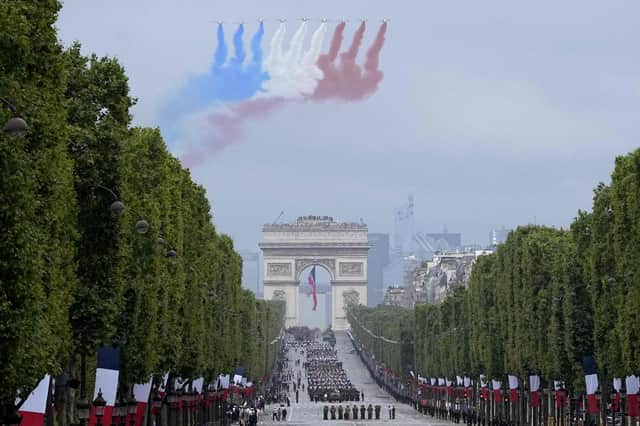Bastille Day 2022: What is France’s national day, when is it - and can you say 'Happy Bastille Day' in French?


It’s viewed as a symbol of freedom and democracy.
Bastille Day is a significant national holiday in France, bringing people together in celebration through firework displays, parades and parties.
French people refer to the day as “Quatorze Juillet” (14 July), or “La Fête Nationale” – it’s called Bastille Day outside of the country but never in France itself.
Advertisement
Hide AdAdvertisement
Hide AdMany English-speaking countries believe that the day commemorates the anniversary of the storming of the Bastille in July 1789 - a major event in the French Revolution.
But what does France’s national day actually represent, and why is it so important?
Here’s what you need to know.
What is Bastille Day?
A common misconception is that Bastille Day celebrates the fall of the Bastille, which was a political prison and symbol of the monarchy.
In fact, the origins of the day are more complex.
It’s synonymous with a different historical event in France, the Fête de la Fédération, according to historians.
Advertisement
Hide AdAdvertisement
Hide AdMeaning “Festival of the Federation” in English, this was a mass gathering held on 14 July 1790, a year after the people of Paris attacked the Bastille.
Citizens planned to steal weapons and ammunition from the grand medieval fortress to fight the royal soldiers stationed in the city, as revolutionaries viewed the Bastille as a symbol of the monarchy’s corruption.
People were unhappy with King Louis XVI’s reign, which had been dominated by food shortages and high taxes. The country was on the brink of an economic crisis.
After outbreaks of violence in Paris, an armed mob stormed the prison on the morning of 14 July and freed the seven remaining prisoners who were being held there.
Advertisement
Hide AdAdvertisement
Hide AdTheir actions ignited the French Revolution, which led to the monarchy eventually being overthrown and Louis XVI and Marie Antoinette, his wife, being executed.
But 1790’s Fête de la Fédération is just as important in the history of Bastille Day as the storming of the prison itself.
The mass gathering, attended by tens of thousands of people from all provinces of France, was organised on the first anniversary of the attack on the Bastille.
It was designed to see in a new era which made way for a French constitutional monarchy.
Advertisement
Hide AdAdvertisement
Hide AdPeople converged on the Champ-de-Mars in Paris to attend a military parade led by Lafayette, a mass and a collective oath-taking. King Louis XVI and Marie-Antoinette gave short speeches.
Of course, less than three years later, the king and queen lost their heads in the guillotine, and the constitutional monarchy became the French First Republic.
When is Bastille Day in 2022?
The national day is celebrated on 14 July each year, which is why it is known as “Quatorze Juillet”.
In 2022, Bastille Day falls on a Thursday.
The day is so widely celebrated in France that it is hard to believe it hasn't always been the country’s national day.
Advertisement
Hide AdAdvertisement
Hide AdInstead, France has had multiple days of national celebration reflecting the politics of its time. In almost a century, it changed its national day six times.
How is Bastille Day celebrated?
It’s a public holiday in France, with millions of people spending time with family and friends and marking the day with fireworks, parades and parties - at least in normal times.
And the Fête de la Fédération, now the oldest and largest military parade in Europe, is still the country’s showpiece event.
Around 4,000 military personnel and police take part in the event held on Paris’s Champs-Élysées, and the French president makes an appearance.
Advertisement
Hide AdAdvertisement
Hide AdHowever, the annual parade was cancelled last year in the wake of the Covid pandemic for the first time since World War II.
But the traditional event will return in scaled-down form this year, with 10,000 people in the stands instead of the usual 25,000.
People will need to show vaccination passes or a recent negative test to go, and all spectators will need to wear face masks.
There will also be a classical music concert on the Champ-de-Mars at the foot of the Eiffel Tower, and the Paris firework display will go ahead.
Advertisement
Hide AdAdvertisement
Hide AdBastille Day is not just confined to France, however, with French citizens around the world also hosting their own events.
Often, the words “liberty, equality and fraternity (brotherhood)” - the three core beliefs of the revolution - are heard during the celebrations.
The French flag and the country’s national anthem are both symbols of the revolution and Bastille Day.
Can you wish someone a ‘Happy Bastille Day’ in French?
As French people refer to the day as “Quatorze Juillet” or “La Fête Nationale” as opposed to Bastille Day, it’s pretty unusual to wish someone a “Happy Bastille Day” as you would with any celebration in the UK.
Advertisement
Hide AdAdvertisement
Hide AdInstead, the correct way to greet someone on the day is by saying “Joyeux Quatorze Juillet”, or “Bonne Fête Nationale”, both of which roughly translate to “have a good national day” in English.
If you wished a French person “Bonne Bastille”, the chances are they wouldn’t have a clue what you were speaking about.
Comment Guidelines
National World encourages reader discussion on our stories. User feedback, insights and back-and-forth exchanges add a rich layer of context to reporting. Please review our Community Guidelines before commenting.
